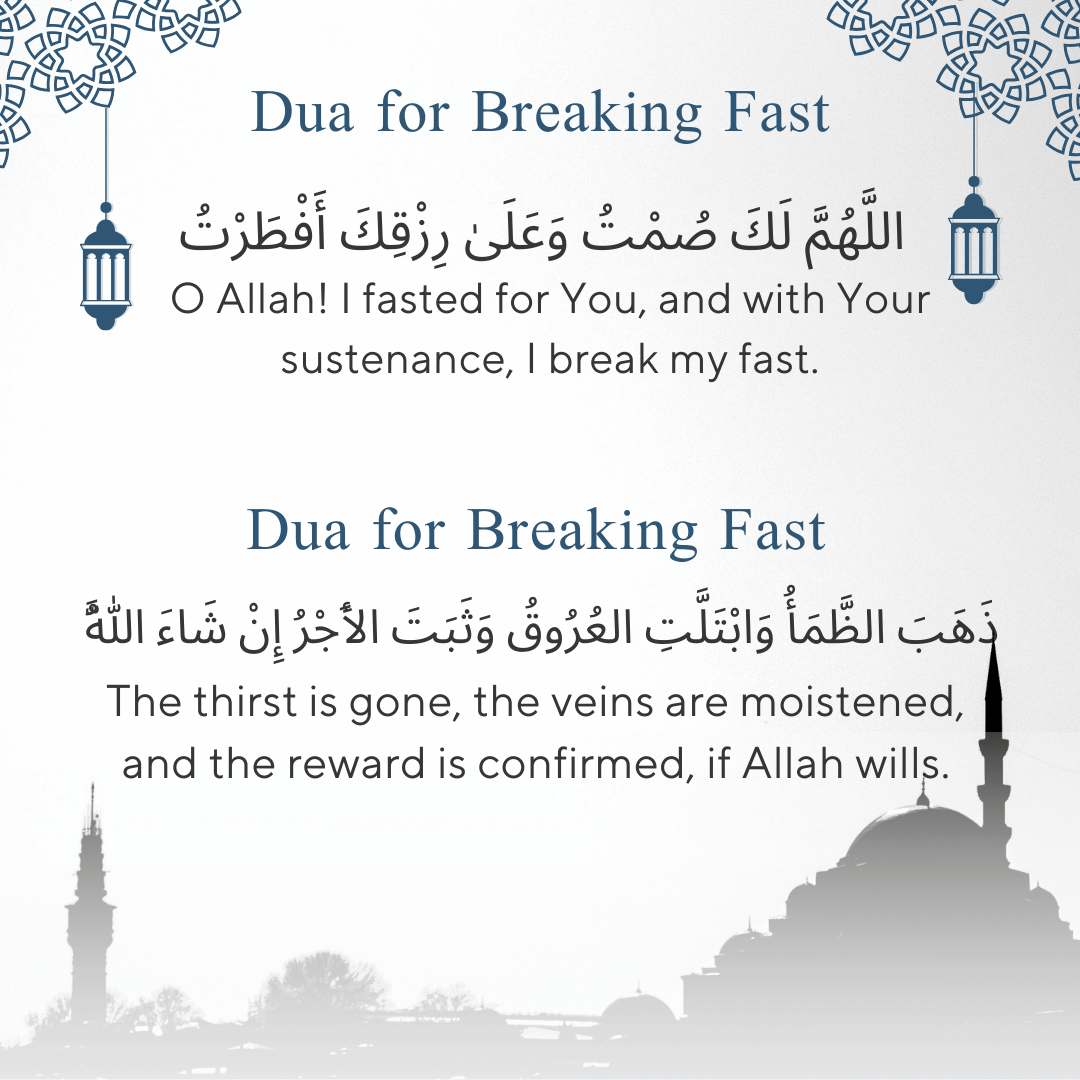Dua for Breaking Fast
Arabic
اللَّهُمَّ لَكَ صُمْتُ وَعَلَىٰ رِزْقِكَ أَفْطَرْتُ
Transliteration
Allahumma laka sumtu wa ‘ala rizqika aftartu.
Translation
O Allah! I fasted for You, and with Your sustenance, I break my fast.
Reference: Abu Dawood, 2358 (weak)
Alternative Dua for Iftar (More Authentic)
Arabic
ذَهَبَ الظَّمَأُ وَابْتَلَّتِ العُرُوقُ وَثَبَتَ الأَجْرُ إِنْ شَاءَ اللَّهُ
Transliteration
Dhahaba al-zama’ wa abtallat al-‘urooq wa thabata al-ajru in sha’ Allah.
Translation
The thirst is gone, the veins are moistened, and the reward is confirmed, if Allah wills.
Reference: Abu Dawood, 2357
Fasting is one of the five pillars of Islam, and the moment of breaking the fast (Iftar) is a spiritually significant time when duas (supplications) are readily accepted. Whether you are fasting in Ramadan or observing a voluntary fast, making dua before breaking your fast is a powerful act of worship.
In this guide, I will explore the authentic duas for breaking fast, their significance, and how they connect us spiritually with Allah. You’ll also learn about the importance of Iftar, relevant Qur’anic verses, and Hadith references that highlight the blessings of supplicating at this moment. Let’s dive deep into the best supplications for Iftar and maximize this golden opportunity for acceptance of prayers.
The Importance of Making Dua at Iftar
The Prophet Muhammad (peace be upon him) emphasized the importance of dua at the time of breaking fast. It is a moment when Allah’s mercy is abundant, and sincere supplications are accepted.
Hadith on the Acceptance of Dua at Iftar
It was narrated from ‘Abdullah bin ‘Amr bin ‘As that the Messenger of Allah (ﷺ) said:“When the fasting person breaks his fast, his supplication is not turned back.”
(One of the narrators) Ibn Abi Mulaikah said: “When he broke his fast, I heard ‘Abdullah bin ‘Amr say: ‘O Allah! I ask You by Your mercy, which encompasses all things, to forgive me. (Ibn Majah, 1753)
From this hadiths, we learn that the moment of Iftar is a golden opportunity for making heartfelt duas. Whether seeking forgiveness, guidance, or blessings, this is a time when we should turn to Allah sincerely.
Recommended: Dua Qunoot: Meaning, Importance, How And When to Recite It
Spiritual Reflections on the Dua for Breaking Fast
Gratitude: Both duas express gratitude to Allah for the ability to fast and the blessing of food and water.
Trust in Allah: The phrase ‘wa thabata al-ajru in sha’ Allah’ reminds us that our reward is only in Allah’s hands.
Mindfulness: Reciting the dua before eating makes us conscious of our purpose in fasting and our dependence on Allah.
Common Mistakes When Making Dua at Iftar
While making dua at Iftar is a powerful practice, there are some common mistakes to avoid:
Rushing Through the Dua: Many people are eager to eat and don’t take the time to sincerely supplicate.
Not Understanding the Meaning: Reciting duas without understanding their meaning reduces their impact.
Neglecting Personal Duas: While reciting the prescribed duas is essential, personal supplications for one’s needs should also be made.
Assalamu Alaikum Owa Rahmatulla!
I run this site alone, with love and dedication, and your support is a blessing from Allah. Every contribution is a Sadaqah Jariyah—a reward that continues to grow, insha’Allah. So if possible, please donate me. Jazhakallah!
Important note
In Islam, a single dua often holds deep, multi-faceted meanings and can address various aspects of life. That’s why you might notice some repetition in my writing—it’s because many duas overlap in the guidance and mercy they bring into our lives. I believe in reinforcing these beautiful lessons as much as possible because their impact is truly profound. So, if it feels like I’m repeating myself, know that it’s with the intention of sharing these precious reminders in every way I can. Thank you for understanding and being part of this journey with me!
As always I seek refuge in Allah Almighty from all kinds of harm and pray that He makes my work easy. I also pray that He considers this effort a means of salvation for us in this world and the hereafter. Whatever is good in my writing is entirely a blessing from Allah Almighty, and any faults are due to Satan (Devil) and my own lack of knowledge. JazakAllah. (Thank you).
You can also read these Duas,
Rabbana atina min ladunka rahma: Dua for Guidance and Mercy
Dua for Drinking Milk: The Sunnah Dua for Blessings & Benefits
Allahumma Anta Rabbi, La ilaha illa Anta, ‘Alayka Tawakkaltu Dua
Allahumma Inni As’alukal Huda Wat Tuqa: Dua For Taqwa
Rabbana Innana Amanna Faghfir Lana: A Dua for Forgiveness
For more dua like this visit this page, Dua and Dhikr.
FAQs section about “Dua for Breaking Fast“
- Can I make my own dua at Iftar?
Yes! While prescribed duas are important, personal supplications are highly encouraged.
2. When exactly should I say the dua?
You should say the dua right before eating or drinking to break your fast.
3. Is dua at Iftar always accepted?
The Prophet (PBUH) said that the dua of a fasting person is not rejected, so we should make sincere supplications.
4. Can I say dua in my own language?
Yes, while Arabic duas are preferred, you can make dua in any language.
5. What should I ask for in my dua?
Ask for forgiveness, guidance, protection, and anything beneficial in this life and the Hereafter.
6. Can I recite dua after breaking my fast?
Yes, making dua even after Iftar is beneficial and encouraged.
7. Does the dua have to be recited aloud?
No, it can be recited silently or aloud.
8. Can children also recite the Iftar dua?
Yes, children should be encouraged to learn and recite the dua.
9. What other acts are recommended at Iftar?
Giving charity, breaking fast with dates, and making additional duas are all recommended.



